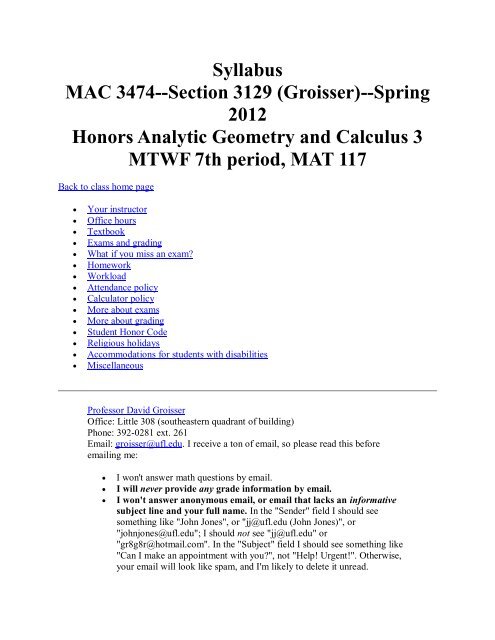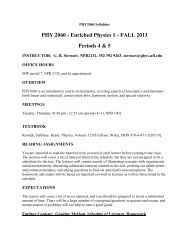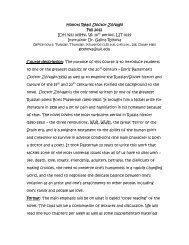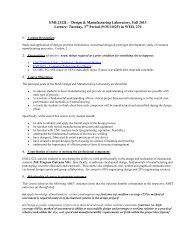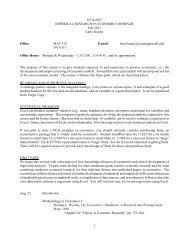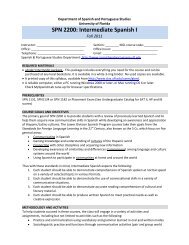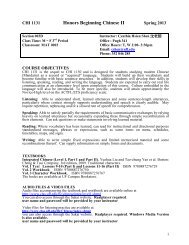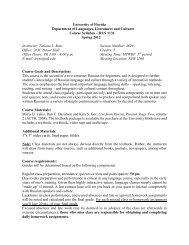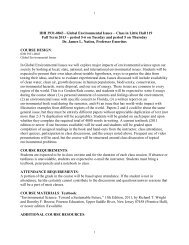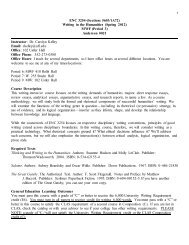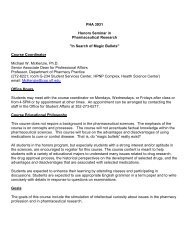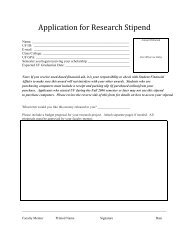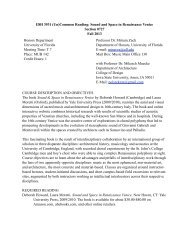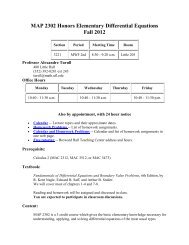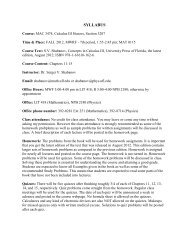MAC 3474 Calculus 3 Groisser - University of Florida Honors Program
MAC 3474 Calculus 3 Groisser - University of Florida Honors Program
MAC 3474 Calculus 3 Groisser - University of Florida Honors Program
Create successful ePaper yourself
Turn your PDF publications into a flip-book with our unique Google optimized e-Paper software.
Syllabus<strong>MAC</strong> <strong>3474</strong>--Section 3129 (<strong>Groisser</strong>)--Spring2012<strong>Honors</strong> Analytic Geometry and <strong>Calculus</strong> 3MTWF 7th period, MAT 117Back to class home pageYour instructorOffice hoursTextbookExams and gradingWhat if you miss an exam?HomeworkWorkloadAttendance policyCalculator policyMore about examsMore about gradingStudent Honor CodeReligious holidaysAccommodations for students with disabilitiesMiscellaneousPr<strong>of</strong>essor David <strong>Groisser</strong>Office: Little 308 (southeastern quadrant <strong>of</strong> building)Phone: 392-0281 ext. 261Email: groisser@ufl.edu. I receive a ton <strong>of</strong> email, so please read this beforeemailing me:I won't answer math questions by email.I will never provide any grade information by email.I won't answer anonymous email, or email that lacks an informativesubject line and your full name. In the "Sender" field I should seesomething like "John Jones", or "jj@ufl.edu (John Jones)", or"johnjones@ufl.edu"; I should not see "jj@ufl.edu" or"gr8g8r@hotmail.com". In the "Subject" field I should see something like"Can I make an appointment with you?", not "Help! Urgent!". Otherwise,your email will look like spam, and I'm likely to delete it unread.
For reasons <strong>of</strong> time and safety, I delete, without reading completely, anyemail that requires me to open an attachment whose nature or purpose Icannot easily determine without opening.Office Hours: Tentatively Monday and Friday 8th period (3:00-3:50), andTuesday 4th period (10:40-11:30). Please come early in the period or let me knowto expect you later; otherwise I may not stay in my <strong>of</strong>fice for the whole period.See my schedule for updates. Students who can't make scheduled <strong>of</strong>fice hoursmay see me by appointment on most weekdays (but never on a Thursday).If you have the flu or similar contagious disease, or think you might, pleasedo not come to my <strong>of</strong>fice.Text: Stewart, <strong>Calculus</strong>: Early Transcendentals, 6th edition (6e). We will coverchapters 12-16 (with some omissions). Topics will include:vector algebraequations and graphs <strong>of</strong> lines, planes, and quadric surfacesvector-valued functions and their applications to motion and curves inspacearclength and curvature <strong>of</strong> curveslimits and continuity <strong>of</strong> functions <strong>of</strong> several variablespartial derivatives and the gradient vectorsmooth surfaces and their tangentmaxima and minima <strong>of</strong> functions <strong>of</strong> several variablesLagrange multipliersmultiple integrals in Cartesian and non-Cartesian coordinate systemsvector fields and their derivativesline integrals and surface integralsthe fundemental integral theorems for vector fieldsI discourage the use <strong>of</strong> solutions manuals. To learn mathematics, you need to seea small number <strong>of</strong> problems worked out, just to see the principles illustrated; youneed to do a large number <strong>of</strong> problems by yourself. The textbook problems that Iassign are selected to be doable based on what should be your accumulated store<strong>of</strong> knowledge and skills, plus the material in the textbook up to that point. In thelong run, you will learn more by struggling with a problem unsuccessfully for twohours, than by giving up after a few minutes and looking at someone else'ssolution.Exams and Grading: Your final grade will be determined by the following:Three midterms (hour exams), each counting 20% <strong>of</strong> final grade. Tentativedates for the midterms are Feb. 3 (Fri.), Feb. 28 (Tues.), and Apr. 2(Mon.).
Cumulative final exam, counting 40% <strong>of</strong> final grade. The final exam willbe given on Friday, May 4, starting at 12:30 p.m., in our usual classroom.Students are expected to arrange their post-semester travel plansaccordingly, and should make those plans NOW. If you are unwillingor unable to arrange to be in town the day and time <strong>of</strong> your exam, youshould try to switch to a section <strong>of</strong> <strong>Calculus</strong> 3 (honors or otherwise)whose exam-date/time you find more convenient. I will have littlesympathy for students who claim they are "unable" to take the finalexam at its scheduled time, or that to do so would pose a hardship. Ifyou put yourself in this position, expect a zero for your final-examgrade.Small bonuses (< 3%) may be given for exceptionally good classroomparticipation. ("Participation" does not simply mean "attendance"; thereare no bonuses just for showing up and breathing.)I reserve the right to adjust the percentages above in individual cases if I feel thatcircumstances warrant.See more about grading below for additional information.What if you miss an exam? If you miss an exam for a valid reason, I will workout something with you that is as fair as is feasible. I almost never give make-upexams, because except in very large classes (which I don't teach) with cookiecutterexams (which I don't give), there is no such thing as a fair make-up exam.To create a make-up exam that's not extremely unfair, either to the student takingit or his/her classmates, usually takes me at least six hours. Therefore, rather thana make-up exam, usually I will just give you a "bye" and simply re-adjust theweights <strong>of</strong> the other components <strong>of</strong> your grade.If you are going to miss an exam due to illness, you should notify me by phone oremail before the exam starts (even if it's just a few minutes before).Homework: will be assigned daily and is due by the next class, but will not becollected. It is critical that you keep up with the homework daily. Far toomuch homework will be assigned for you to catch up after a several-daylapse, even if you think from your past experience that you will be able to dothis. I cannot stress this strongly enough. Students who do not keep up with thehomework frequently receive D's or worse (or drop the class to avoid receivingsuch a grade).The assignments will be posted on the homework web page . The dates more thanone day in advance are estimates, and there will be frequent updates. Assignmentsmay also be modified in class according to how far we get on a given day. Youare responsible for checking this page frequently, since in addition to updatedassignments, other important information such as exam dates will be confirmed
on that page. Of course, exam-date changes will also be announced in class wellin advance, and more than once.However, if you are unaware <strong>of</strong> a changed exam date because youweren't in class when it was changed and you didn't check thehomework page for several days, and this causes you to miss an examor do poorly on it, that grade (0 if you miss the exam) will still beaveraged into your final grade according to the percentages above.On most days I won't answer homework questions in class; you should see me in<strong>of</strong>fice hours for homework questions (and any other questions you didn't get toask in class). However, as long as we're on pace to get through the syllabus,roughly once a week I will devote the entire period to going over homework andanswering any other left-over questions. The class day before an exam willalways be used for Q&A.Workload: On average, in order to receive a satisfactory grade (C or C+),students with good preparation for this class should expect to spend eight totwelve hours per week studying and doing homework for this class. This estimateis an average, not a maximum—some students will require more time, some less;some weeks the workload will be heavier, some lighter. Some circumstances thatmay increase your workload are: You did not study a similar amount in your previous classes. You cannot do algebra quickly and accurately without a calculator (thismay be the case if you did not do a large number <strong>of</strong> exercises in yourcalculus or pre-calculus classes, or have relied heavily on calculators inthe past). You want to get an A.Attendance policy. Barring valid reasons such as illness, weddings, funerals,family emergencies, and team activities, I expect students to be in class every dayand on time, paying attention for all 50 minutes <strong>of</strong> the period. Coming late to classis disruptive to both your instructor and your classmates.If another time commitment (e.g. a class the previous period in adistant location) will force you to be late on a regular basis, youshould try to switch to another section.Currently I plan to take attendance but not to factor it into your grade directly.However, students who choose not to regularly attend class (not counting validreasons such as those mentioned above) should not expect the same considerationin <strong>of</strong>fice hours that students with good attendance will receive. Be aware that the<strong>University</strong> <strong>of</strong> <strong>Florida</strong> Attendance Policies contains the following paragraph:
The university recognizes the right <strong>of</strong> the individual pr<strong>of</strong>essor tomake attendance mandatory. After due warning, pr<strong>of</strong>essors mayprohibit further attendance and subsequently assign a failing gradefor excessive absences.Students with a contagious illness are asked to exercise good judgment and tobe considerate <strong>of</strong> their classmates and instructor when deciding whether tocome to class. Coughing and sneezing in an enclosed space like a classroomor <strong>of</strong>fice is a wonderful way to spread germs.Calculator Policy: Calculators are not allowed on exams, and generally shouldnot be used for homework, although occasionally a homework problem may beassigned that requires a calculator.More about exams. Most exam problems will be similar to homework, but onmost exams I try to put at least one problem that you won't have seen a clone <strong>of</strong>before. Such problems will involve no new concepts, but may, for example,combine concepts from different parts <strong>of</strong> the syllabus. I do this to see whetheryou've gone beyond memorizing a bunch <strong>of</strong> formulas and rules, and haveachieved a real understanding <strong>of</strong> the material---which you'll need for an A.I will give you a copy <strong>of</strong> an old exam a week prior to your exam, as a sample <strong>of</strong>the type and number <strong>of</strong> questions I have asked in the past. Do not expect thequestions on your exam to be just minor variations <strong>of</strong> questions on thesample exam,although this may be the case for a small number <strong>of</strong> questions.More about grading. The grades that UF currently allows instructors to assignare A, A–, B+, B, B–, C+, C, C–, D+, D, D–, and E. (For grade-pointequivalencies <strong>of</strong> these grades, see this catalog page.) All <strong>of</strong> these are grades I willconsider assigning, except possibly the D–. Be aware that for many requirementsat UF, courses that you've taken count only if you get a C or higher; a C– will notmeet such requirements.I don't have a predetermined grade curve or predetermined percentages forletter grades. I decide the grade scale for each exam and homeworkaccording to the philosophy A = excellent, B = good, C = satisfactory, D =unsatisfactory but passing. At the end <strong>of</strong> the semester, I use the cut<strong>of</strong>fsfrom the exams and homework and to determine the final grade cut<strong>of</strong>fs ona 1000-point scale. For example if the cut<strong>of</strong>f for a B is 72% on the firsthour exam, 69% on the second hour exam, 76% on the third hour exam,and 74% on the final, to get a B for the course you'd need .20 x(72%+69%+76%) + (.40 x 74%) = 73% <strong>of</strong> the total number <strong>of</strong> points inthe course, i.e. 730/1000.In my approach to assigning minus-grades (the same as the approach usedby my pr<strong>of</strong>essors when I was in college), a B–, for example, is not the
lower end <strong>of</strong> the B-range; it is slightly but strictly below the bottom <strong>of</strong> theB-range, and means that your work falls a little short <strong>of</strong> "good". (In theexample above, 730 was the cut<strong>of</strong>f for a B, not a B–. The cut<strong>of</strong>f for a B–would have been 1/3 <strong>of</strong> the way down to the cut<strong>of</strong>f for a C.) Similarly, aC– means that your work was short <strong>of</strong> satisfactory, so should not counttowards any requirement involving courses completed satisfactorily.Said another way: another pr<strong>of</strong>essor whose estimation <strong>of</strong> whether yourwork was satisfactory is the same as mine, but who regards C– as meaning"the low end <strong>of</strong> the satisfactory range", would not assign you a C–; hewould assign you a D+.Since I don't determine the exam-grade cut<strong>of</strong>fs ahead <strong>of</strong> time, I can't tell you inadvance exactly how many points you'll need to get a particular grade for thecourse. However, for an example <strong>of</strong> past grade scales, see the grade scale page forthe last time I taught <strong>Honors</strong> <strong>Calculus</strong> 3 (Spring 2010) and <strong>Honors</strong> <strong>Calculus</strong> 2(Fall 2011). There is no guarantee that this semester's grade cut<strong>of</strong>fs will beclose to those <strong>of</strong> the past classes; they could be higher or lower. To see a largersample you're welcome to look at my grade-scales for classes older taught earlierthan the ones above (you can find these easily by navigating from my homepage), but be aware that prior to Summer 2009 UF had a bizarre "plus-grades butno minus-grades" system that forced me to decide whether to assign, for example,a C+ or a B to someone who I thought deserved a B–, in which case I rounded upto a B. So the cut<strong>of</strong>fs that you see in my past classes for A, B, and C areapproximately where I'd have set the cut<strong>of</strong>fs for A–, B–, and C– had these gradesbeen assignable at the time, which would have made my class GPA's a littlelower.Student Honor Code: Students are expected to abide by the the Honor Code:We, the members <strong>of</strong> the <strong>University</strong> <strong>of</strong> <strong>Florida</strong> community, pledgeto hold ourselves and our peers to the highest standards <strong>of</strong> honestyand integrity.On all work submitted for credit by students at the university, the followingpledge is either required or implied: "On my honor, I have neither given norreceived unauthorized aid in doing this assignment."Religious Holidays: The following is part <strong>of</strong> the <strong>University</strong> <strong>of</strong> <strong>Florida</strong> Policy onReligious Holidays . "Students, upon prior notification <strong>of</strong> their instructors,shall be excused from class or other scheduled academic activity to observe areligious holy day <strong>of</strong> their faith."Accommodations for students with disabilities: Students requesting classroomaccommodation must first register with the Dean <strong>of</strong> Students Office. The Dean <strong>of</strong>Students Office will provide documentation to the student who must then providethis documentation to the instructor when requesting accommodation.
Miscellaneous:Unless I say otherwise, you are responsible for knowing any material Icover in class, any subject covered in homework, and all the material inthe textbook chapters we are studying.If you miss class the day I return an exam, you'll have one week to pick upyour exam up from my <strong>of</strong>fice, after which I may discard your paper(unless you arrange with me a day and time in the near future for you tocome and pick it up).Cell-phone ringers, audible text-message alerts, etc., should be turned <strong>of</strong>fwhile you are in class. You may leave your phones in "vibrate" mode sothat if UF sends an Emergency Alert, you will receive it. Note that in thiscase everybody's phone will be vibrating at the same time, so it will beobvious that something significant is happening. If your phone startsvibrating and nobody else's does, please ignore it. (If you ever need me tomake an exception to this rule, e.g. if you have a seriously ill familymember, let me know before class starts.)Please also avoid other disruptive or distracting noises, such as the tapping<strong>of</strong> pencils or feet, or the zipping and unzipping <strong>of</strong> backpacks severalminutes before the end <strong>of</strong> class.Do not use your personal computer in class. Ditto for your cellphone,except to receive emergency alerts from UF. In particular, do not read orwrite text-messages in class.Do not read, do the crossword puzzle, etc., while you are in class. If you'retoo bored to pay attention, do homework.Last update made by D. <strong>Groisser</strong> Mon Dec 19 22:26:26 EST 2011


